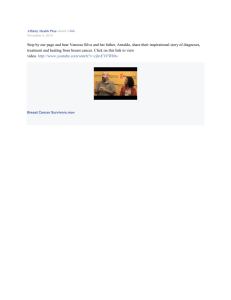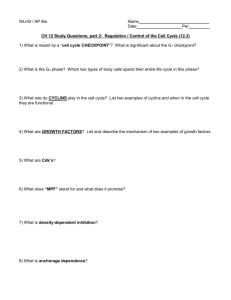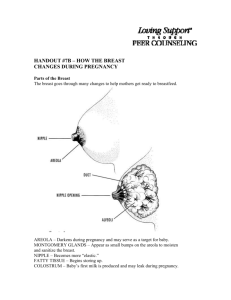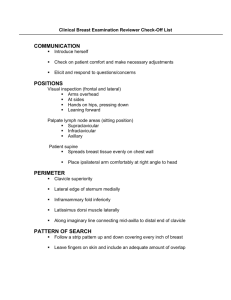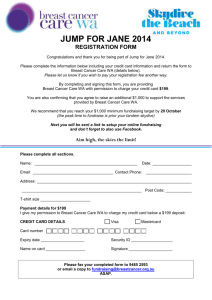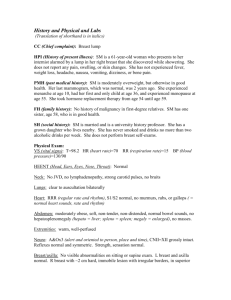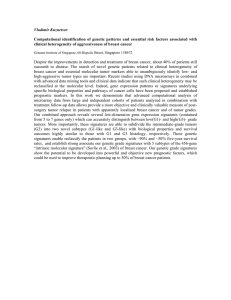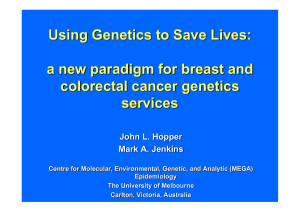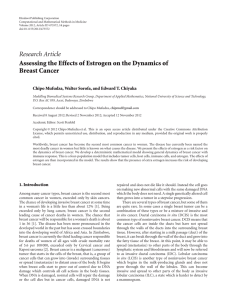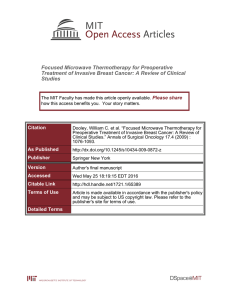Cancer - City Tech OpenLab
advertisement
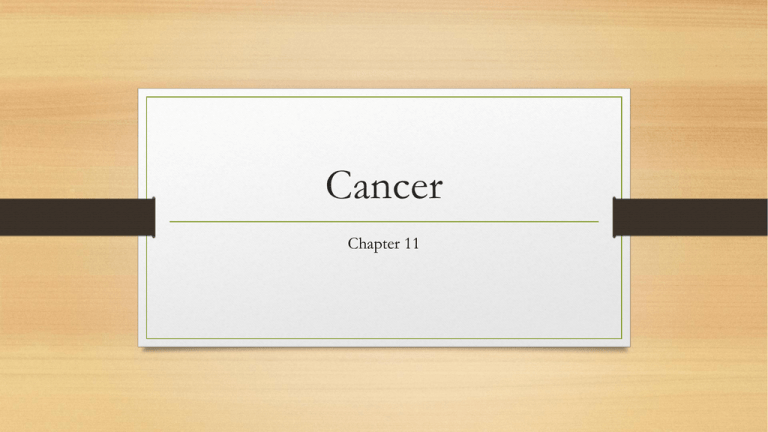
Cancer Chapter 11 Defining Cancer • “Cancer” represents a number of diseases • Definition: A collection of cells that reproduce in an uncontrolled way to produce a mass of cells • Causes: Chemical Agents; Biological Agents; Environmental Factors; Genetic Factors; Individual Behaviors Tumors • • • • Cell mass=tumor (two types) Benign tumor (may grow in size, but do not reproduce or spread) Malignant tumor (life threatening) Tumors in action Metastasize (spread) Categories of Cancer • Categorized based on cellular typology 1) Carcinomas- epithelial cells found in skin, glands, or organs 2) Sarcomas- soft tissues including fat, muscle, nerves, or tendons 3) Leukemia- blood producing tissue, e.g., bone marrow 4) Lymphomas- glandular (lymphatic system); organs producing white blood cells Examples of Cancer Categories Type Examples Outcome Other Carcinomas Skin, breast, liver, bladder, and prostate Likely to be fatal (with the exception of skin cancer); the most common type is not always the deadliest >50% of new cancer cases every year are skin cancer Sarcomas Kaposi’s sarcoma Typically malignant; often metastasize Genetic as well as chemical and viral causes Leukemia Leukemia, Childhood leukemia Very high mortality rate 70% of people in need of bone marrow transplant cannot find match; within families 40% of White/2% of Blacks find sibling matches Lymphomas Hodgkin's lymphoma, NonHodgkin’s lymphoma Non-Hodgkin’s fatal; Hodgkin’s less severe, less likely to metastasize Affects T and B white blood cells; become malformed and malfunction Cancer: Gender Differences • • • • • • Is cancer a women’s disease? Men have higher risks (behaviorally and otherwise) Most common among U.S. men: prostate, lung, and colorectal Most common among U.S. women: breast, lung, and colorectal # of female smokers continues to grow Cancer is not the leading cause of death for men or women in the U.S. Cancer: Genetic Risk Genetics: Let’s recall what genes can tell us about a person? • Ancestral geography OR paternal/familial information • BRCA1 and BRCA2 when mutated, have been linked to breast cancer • This speaks to geography—Ashkenazi Jewish women and groups of English/Icelandic women • Originally 18%-20% of all breast cancer occurred within Ashkenazi population • Ashkenazi women have an 82% risk for developing breast cancer over their entire lifetime (this includes an increase in risk with age) • Lynch syndrome (an inherited disease) has been linked to colorectal cancers • This speaks to familial (or generational) transmission • 1st, 2nd, and 3rd degree relatives increases the likelihood (relative risk) for developing colorectal cancer Cancer: Racial Differences • Greater incidence of breast cancer in White U.S. women than in other racial groups • Greater incidence of death due to breast cancer in Black and Latina women • Why? • Access to care/insurance as it correlates to race in U.S. • Socioeconomic class as it correlates to race in U.S. Unfortunately, these findings hold for all cancers, not just breast cancer Cancer: Risk Factors • Environmental (Carcinogens) • Behavioral • Pesticides • Smoking • Air pollution • Diet • Nuclear waste • Exercise • Asbestos • Obesity • Cell phones (?) • STDs Prevention and Early Detection is EVERYTHING • Diet and Exercise: Fast food culture and colon cancer • Breast self-examination • Vaccinations The Diagnosis: What happens next? • Next week we will cover more about receiving a cancer diagnosis • Psychologically • Comorbidity: depression, anxiety, fear • Patient-provider relations • Medical treatment • Removal of mass/tumor • Chemotherapy Psychotherapeutic Approaches • • • • • • • • • • Ms. Nobel will provide us with more detail next week! Cognitive behavioral therapy Educational intervention Bibliotherapy Supportive-Expressive therapy (meaning-making) Complementary/Alternative therapies (CAM) Coping strategies (emotion focused comping can leave you being more focused on your symptoms) Sprituality Social-emotional support: face to face or online Interpersonal relationships and advocacy
